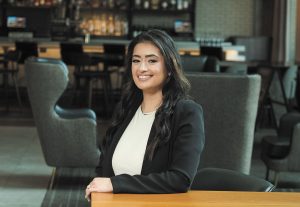Subscriber Benefit
As a subscriber you can listen to articles at work, in the car, or while you work out. Subscribe Now
Hensley Legal Group P.C.
University of Iowa College of Law, 2016
Why did you decide to enter the legal profession?
The history of law has always fascinated me. As a Catholic school kid, class lessons were intertwined with parables and the prevailing legal principles of their times. Central to these parables was a stark sense of “fairness.” As I got older I could better discern the complexities of the law and inequalities in its enforcement. Yet the law remains a pervasive force in our daily lives, even if we don’t realize it. I initially thought I would go into policy to effect change, push for good laws and ensure their fair enforcement. However, I found I enjoy helping people understand the “why” of the law a lot more and in doing so, giving them tools and confidence to advocate for themselves, ensuring a more equitable legal landscape.
What does “diversity, equity and inclusion” mean to you?
It means creating and providing an environment where decision-makers are reflective of our society rather than treating diversity as a mere checkbox. It means investing in our future and advocating for the advancement of underrepresented voices. We have to reckon with ugly truths about ourselves and our history to ensure we are progressing to a society that is truly for “all.”
How did you get involved in DEI work, and why have you stuck with it?
There wasn’t a particular event or situation that I could say was the “start” of my DEI work. For those of us in the BIPOC and LGBTQ+ community, each day, situation and interaction is often shaped by society’s perception of our identity rather than our individual selves. There’s an internal pressure to be a representative even when you don’t want to be. My commitment to this work is driven by a deep desire to honor the efforts of those who paved the way before me and to ease the path for the generation that will follow.
What would you say to someone who perceives “DEI” as a business “buzzword”?
See last response.
What is the most significant change you’ve seen in the legal profession since you began your career?
We still have a long way to go, but the representation on the bench all over the country has been inspiring to see. Besides that, I love that more people are pushing back on the antiquated norms (and stereotypes) of a traditional law career. We’re prioritizing work-life balance, mental health and setting boundaries.
What’s the best advice you’ve ever received?
“Nobody cares (as much as you think they do)!” My dad was trying to explain, in a way only a dad could, that people are more absorbed in their own thoughts and problems than in worrying about my bad hair day at Christmas mass. It helps me put things in perspective.
How do you spend your free time?
As an attorney, I couldn’t live with myself I didn’t respond with “it depends … ” to at least one question. When time permits, I like to fit in a workout before or after work. Weekday evenings are typically spent with my husband — we’re both pretty busy and enjoy winding down with a movie or board game at the end of the day. Weekends I like to explore the city, garden, go out dancing or have a “Val Day,” which is a more boring, yet just as satisfying, version of a “Treat Yo Self” day from the show “Parks and Recreation.”
What was your favorite — and least favorite — class in law school?
Favorite was Evidence; least favorite was Civil Procedure.
We’re told you’re an advocate for helping non-English-speaking clients understand the complexities of the American legal system. What drives that passion in you?
My parents, and a sense of fairness. Most English-speaking individuals have a hard time understanding the complexities; now imagine explaining the same thing to someone who doesn’t understand the language and may have a completely different context of or experience with the law due to growing up in a different country. Our obligation as lawyers includes ensuring that our clients know what’s going on with their cases, the implications of new facts or the possible outcomes at trial so they can make informed decisions with regard to their cases. And for many of my clients, this doesn’t stop at the legal system — it usually affects their ability to advocate for themselves in everyday situations such as their child’s school, financial institutions or with medical providers. Not only are they dealing with a completely unbalanced power dynamic, but they are also unable to fully advocate for themselves because of a language barrier — that is wholly unfair. The deck is stacked against them, and as an advocate for fairness, I feel it’s my duty to try my best to level the playing field.
You’re heavily involved in the Diversity Job Fair. Why are programs like that important for the future of the legal profession?
My involvement has been pretty light in comparison to the co-chairs — Bianca Black and Brett Thomas — as well as the other members of their committee. They had to work with a shortened timeline this year and still ensured there was a good turnout from the students and employers.
It’s important because it shows the students much-needed representation and that a potential employer (and by extension, the legal community) believes in the importance of diversity within the legal culture. I also want to emphasize that hiring is the bare minimum. Diversity means nothing if there isn’t meaningful support, mentorship and opportunity for diverse lawyers.
Please enable JavaScript to view this content.
